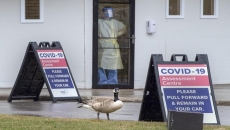If you want to avoid chemical weedkillers but don't like the idea of hand hoeing or bouncing along behind a rototiller, you still have options to keep weeds from taking over your garden.
MULCH
For starters, there's mulches, which can smother weeds. Pile organic mulches such as leaves, grass clippings, or wood chips a few inches deep over the ground to slow evaporation of water from the soil and keep it cooler. Be careful not to pile mulches right up against young plants or their stems might rot.
Organic mulches decompose over time so need regular replenishment. That’s not a bad thing, because their decomposition feeds beneficial soil microorganisms and releases nutrients for plant use. These mulches also enrich the soil with humus, which helps keep soils moist and well aerated.
Synthetic mulches are another way to quell weeds. Black plastic is the most common. It’s easy to lay down, effectively suppresses weeds, and hastens warming of the soil in spring. Recent experiments with other colored plastic films have shown effects on both pests and plant growth. A reflective plastic mulch, for example, keeps aphids at bay.
A big disadvantage of plastics is that they break apart over time, so eventually need to be disposed of. Plastic mulch also can cause problems due to poor soil aeration, and it adds nothing to the soil as far as nutrients or humus or stimulating beneficial microorganisms.
A mulch that combines some of the benefits of both plastics and organic materials is paper. Use recycled paper manufactured specifically as mulch, any plain paper such as newspaper (black and white pages only) or building paper (such as Gray Rosin Paper). Paper mulches are easy to lay down and eventually decompose, so they don’t cause a disposal problem. Paper adds little to the soil, however, in terms of humus or nutrients.
WEEDING GEESE
Looking for something offbeat in weed control? If your garden is large and your weeds are mostly grasses, consider geese.
Young geese will eat their weight in weeds every day. All you need to provide is water, shade, and some supplemental feed, as well as fencing to keep the geese in and predators out.
A couple of geese will patrol up to about an acre, and keep each other company. One caution: Don’t forget that corn is a grass. Plant corn and they’ll eat that too.
INDIRECT WEED CONTROL
Besides direct attacks on weeds, consider how your gardening practices indirectly influence weed growth in your garden.
Close spacing of plants, for example, shades the ground so lessens weed growth.
How you water also has an effect. When you use a sprinkler, you blanket your whole garden with moisture, including paths and spaces between large plants. Weeds sprout in those bare spaces opportunistically, gulp up that extra water and thrive. Drip irrigation, on the other hand, pinpoints the water supply right to the roots of your cultivated plants.
Whether or not you till your soil also influences weed growth. Lying dormant in every soil are millions of weed seeds just waiting to be awakened by light and air. Although hand digging, rototilling and plowing bury existing growth, these practices also inadvertently “sow” new weeds as seeds are brought to the surface.
If you do not till, you can avoid potential problems with soil compaction by laying out your garden in permanent beds on which you never step, roll your wheelbarrow or drive machinery. Just lay any compost or fertilizer right on top of the ground.
Using any or all of the techniques mentioned will not permanently eradicate weeds. Your goal, rather, is to keep weeds in check. You are looking for a truce -- one that requires constant attention rather than massive effort.






